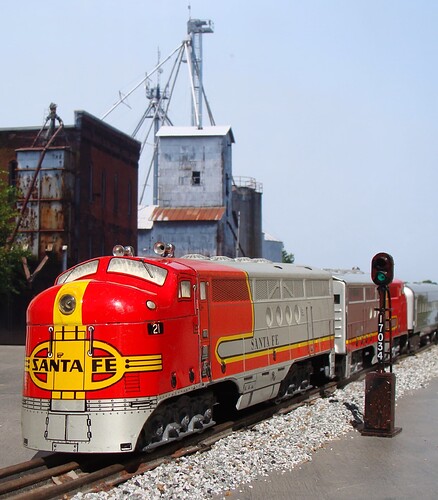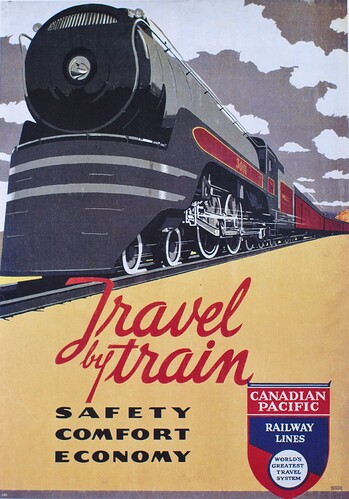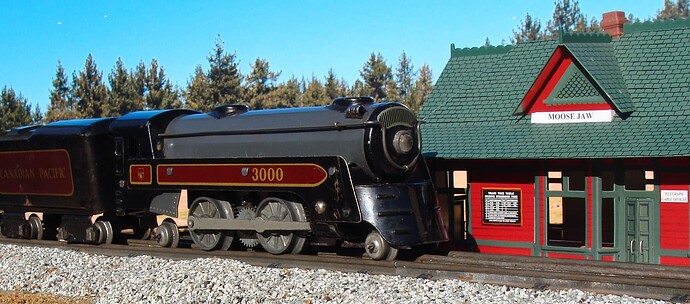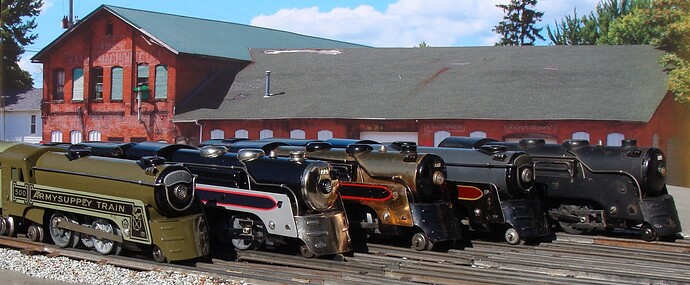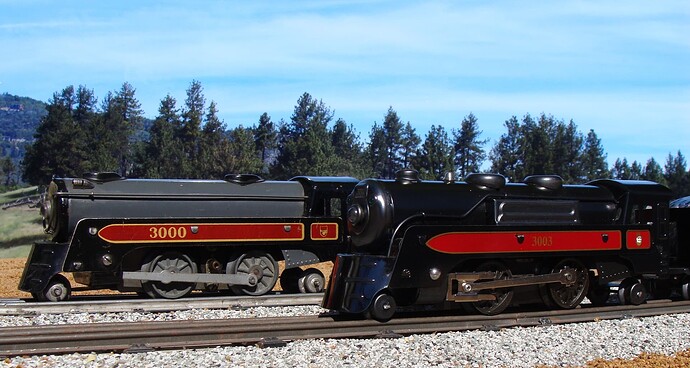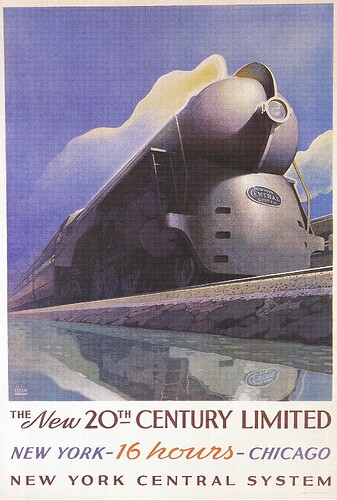@Eric1946 I didn’t know that detail about the optional diecast knuckles! Very cool. I’ve always been a smidge perplexed over what prototype the Marx 21 is representing, the body certainly does scream “FT”, but then there’s the odd choice of the simulated 6-wheel trucks.
Seems like everyone in O gauge wanted a piece of the EMD F-Unit pie after Lionel’s success, AMT (later Kusan) had their F7, General Models (later All-Nation) had their F3, and Unique Art had the Rock Island units. I wonder if they were inspired by Lionel’s success with their F3, or if there were simply a desire to produce models of widely used contemporary diesel prototypes.
Love seeing the 21 against the other Marx cab diesels for scale.
-El
4 Likes
I hadn’t heard about the knuckle coupler either! Possibly so owners could pair them with AMT cars the same way Lionel owners were doing?
And there’s NOTHING in all of Marx production that gets my eyes popping and heart racing the way the number 21 does!
PS I suspect the simulated six wheel truck situation had a backstory similar to that of the Titanic’s (and her sisters Olympic and Brittanic) fourth funnel: purely decorative but psychologically useful in the minds of consumers. Size demonstrates power even if it’s just a hollow illusion? 
5 Likes
The January/February 2023 issue of Classic Toy Trains magazine published a very interesting letter on page 9 from a Mr. Carl Byron of Groton, Mass. that provides some fascinating information about the trucks and the lithography of the Marx 21 diesel. According to Mr. Byron, the 21 combines elements from three different Electro-Motive locomotives that were associated with the El Capitan and the Super Chief over the years. If you can track down that issue, his comments will clear up many of the questions you might have about this particular diesel.
6 Likes
In his catalog of Marx parts, Robert Grossman offers a reproduction of the Marx 21’s optional knuckle coupler.
4 Likes
The Marx 21 diesel is one of my all-time favorites to photograph!
9 Likes
And with good reason. Gorgeous loco!
Rich
2 Likes
A Canadian F2a 3000-series locomotive is prominently featured on this vintage Canadian Pacific travel poster.
7 Likes
Introduced in 1937, Marx’s Canadian Pacific locomotive closely resembled the 3000-series prototype. (The three distinctive bands on the streamlined, wrap-around pilot are characteristic of these locomotives.) It has been suggested that the Canadian Pacific might have helped to finance the tooling for this locomotive.
9 Likes
Even after Canadian Pacific sets were no longer being made, Marx continued to use the locomotive’s tooling to create a seemingly endless number of variants. (Some sources say 50 or more.) Gathered together here for a family portrait are just a few of these variants. Between 1937 and 1952 half a million CP-type locomotives were made.
10 Likes
When James and Debby Flynn revived the manufacturing of Marx lithographed tin trains in the early 1990s, among the first items to appear in their catalog were boxed sets of Canadian Pacific coaches headed up by a 3000 series 2-4-2 Canadian Pacific locomotive made using the original Marx tooling. Seen here side by side are a 3000 Canadian Pacific locomotive from 1936 and a New Marx 3003 Canadian Pacific locomotive from the early 1990s. The family resemblance is unmistakable!
11 Likes
Oh, love those photos, especially the first one.
Rich
4 Likes
Who made the tinplate station? And right behind the #21 is the #3000 on my Marx wishlist! 
6 Likes
The tinplate station was made by Hallmark. (I added the name Moose Jaw, which is an actual Canadian city.)
4 Likes
Really?!? Is that the Sarah Plain and Tall depot?
3 Likes
I have a rather battered 3000… it is a very attractive engine. I am still looking for a matching tender for it.
-El
3 Likes
It’s the Hallmark “Oceanside Depot.” I found it in an antique mall in Maumee, Ohio a couple of years ago and am delighted to have it.
6 Likes
pennytrains,
At one time I had all of the Sarah Plain and Tall buildings. They are closer to HO gauge.
Northwoods Flyer
4 Likes
Among the most iconic locomotives of the 1930s were the NYC Hudsons that were streamlined by noted industrial designer Henry Dreyfuss. Introduced in 1938, the Dreyfuss Hudsons powered the NYC’s new streamlined 20th Century Limited, which Dreyfuss had also designed.
8 Likes
